 Production review by Nick Pearce One of the stranger things you can see over the course of an hour is the lessons that pigs will give you in a dictatorship. But the University of Nebraska-Omaha’s performance of George Orwell’s Animal Farm (Normandale Black Box, 1/22 at 9, 11:30, 2, and 4) was an entertaining and chilling teacher. The story, adapted to the stage by director Jack Zerbe, centers on the efforts of farm animals to create a barnyard utopia (Moo-topia?), before descending into a totalitarian dictatorship. As their lives fall to oppression, the attitudes of those involved offer a damning indictment of both humankind’s lust to power, and to the lengths people will go to avoid confronting their problems. The story was told by a spirited and talented ensemble cast that filled the room with a passion. In particular, Randy Breedlove and Alychia Bilstein, both shone in the production. Bilstein, who played Squealer the pig as well as a narrator, fulfilled one of any dictatorship’s needs: a speaker. The speeches given, with a predictably textbook list of why things were changing to totalitarianism, were a propaganda masterpiece. It seems unlikely Bilstein won’t find theatrical work after college, but should that occur, I imagine North Korea’s national news service would welcome her with open arms. Breedlove, masterfully switching between distinct personas as Benjamin the Donkey and Napoleon the Pig, simply looked like a dictator. The distinct military style of his costume (Major points to Melissa Valdez, the costume designer), the cold and reserved demeanor, and the rigid and contemptuous attitude all gave me chills, as if I was watching the rise of Hitler or Stalin. Every cautionary tale needs a villain, and Breedlove perfectly fit the bill. The true conflict that emerged though, was not in the dimly lit and vaguely foggy theatre (a perfect aesthetic for a clandestine revolutionary meeting, and a credit to lighting designer Audrey Wardian), but in the minds of the actors. The oppressed animals are steeped in Regressive Ideology, a term that Zerbe uses to discuss people truly believing that negative factors are good for them and inescapable, while they are in fact harmful and changeable. The work horse Boxer (Michael Juarez) embodied this, believing that it was a lack of hard work that caused the farm’s woes, rather than the increasing selfishness of the ruling pigs. To his dying breath, he labored for the farm, believing in Napoleon to infallible, even as he was carted off to the slaughter house. Juarez was incredibly genuine in his role, giving me a much more complex view of life for those under tyrannical heels (or hooves). This powerful work was so relatable not just because it showed the audience how real human impulses are, but by holding a twisted mirror for us to also see how close to the animals we can become. The drive to establish total authority, as well as being brainwashed to accepting that authority, is a dark chapter repeated over and over through the pages of human history. Animal Farm is a chilling reminder not of how far we have risen, but of how far we can fall. CAST: Alychia Bilstein Randy Breedlove Faith Gatewood Makenzie Hemphill Michael Juarez Michael Judah Leslie Little Molly Mittan Dylan Moellenberndt Andy Prescott Kameron Shelley Kisten Wilson ARTISTIC STAFF Director: Jack Zerbe Production Manager: Sarah Buck Stage Manager: Hannah Klein Original Design Concept: Robin Vest Lighting Design: Audrey Wardian Costume Design: Melissa Valdez Sound Designer: Aaron David Wrigley Publicity Graphic: Marc Williams Dramaturg: Lucas Perez-Leahy Property manager: Savannah Savick  Meet Zarif! Profile by Carrie Winship Zarif Bakirova is a first time patron of KCACTF Region 5. Originally from Azerbaijan, Zarif is currently a Fulbright Fellow working on her Master’s degree in Theatre at the University of Missouri. Zarif values theatre for its potential as a collaborative and meaningful art. She shares, “I love collaboration in theatre. Collaboration to create something. I think theatre is very intelligent, like, it’s entertainment, but it’s very intelligent entertainment. And you can achieve a lot with that. You can do it for the topics that are important for society now.” At this year’s festival Zarif has been a voracious participant in the many opportunities for interaction with mentors, fellow artists, and friends offered at Festival 48. She presented dramaturgy on Annie Baker’s The Flick for the Regional Dramaturgy Award competition, and served as one of the first dramaturgs to be a part of the 10-Minute Play festival—which included the chance to speak with artists working at the Playwright’s Center in Minneapolis—her highpoint of the conference. For Zarif, the opportunity to share her passion with others is what it is all about. “It was an amazing experience to see so many people passionate about theatre together. It’s very inspiring.” Raving About Carrie Winship
Profile by Leslie Howard Innovation is inspiration. And innovation in education is developing into a larger and larger debate regarding the importance and accessibility of collegiate education. At the KCACTF conference, educators are awarded for contributing to the innovative evolution of education. This year, University of Missouri PhD candidate, Carrie Winship, was nominated for and received the conference’s Graduate Student Innovative Teaching Award. However, Carrie’s work surpasses the realm of innovative education. Her dedication to theatre is exemplified by her KCACTF schedule. This week, Carrie not only participated in the Institute for Theatre Journalism Advocacy as a journalist, she submitted a dramaturgical display to the design expo and is directing an SDC scene advancing to the competition’s final round this afternoon. Carrie’s exceptional well-rounded nature is one of her best tools in the classroom. She is knowledgeable and can back up her advice to aspiring artists with diverse examples from personal experiences and undeniable credibility. While continuing to lengthen her list of accolades at KCACTF, Carrie is simultaneously preparing to teach a revitalized Theatre History course, which is required for all MU theatre majors. It goes without saying; Carrie Winship is impressive and an inspiration to her students. Congratulations, Carrie! By Emily Schoenbeck
I could have sworn I didn’t like musical revues. But I must, since Smokey Joe’s Cafe was a pleasure from the first beat to the last refrain. Wichita State University’s production was so tightly choreographed and well-paced it turned two hours into the blink of an eye. Rocking and rolling out such hits as “Jailhouse Rock” and “Stand By Me”, the show had audience members on their feet clapping along. The nine person cast was outstanding down to the last actor. Musical revues are carried on the voice talent of their ensembles. This cast not only bore the weight of these classic tunes but took many of them to new heights. The four “drifters” in particular infused their numbers with a playfulness many might not have anticipated in these oldies. Backed-up by a spirited band, the show hits not just musical, but comedic beats as well. It would be remiss to not also give a nod to the production’s costume team, who managed not only beautiful period outfits, but quick changes that must have themselves been a considerable feat. How can you not to sing the praises of such a smarty performed musical revue? Walking in, I can’t say how many were familiar with Leiber and Stoller. Walking out, I can guarantee the ranks of their fans swelled. If you find yourself needing a little love, this is one show you don’t want to skip. Your only regret? That you can’t join them onstage. Smokey Joe's Cafe Words and Music by Jerry Lieber and Mike Stoller Directed by Amy Baker Schwiethale Cast Keshana Cook, Da ‘Merius Ford, Dylan Harris, Brittnee Hill, Amanda Huehl Phillips, Deiondre Teagle, Melvin Thampy, Madi White, Naaman Williams Band Philip M. Taylor, JuleAnn Troutman, Jimmy Jensen, Andy Slater, Dion Burton, Micah White Designers & Crew Musical Director- Philip M. Taylor Production Stage Manager & Scenic Designer- David Neville Costume Designer- Catie Wieck Lighting Designer- Alyce Murphy Sound Designer- Marlo Griffith Production review by
Katlin Lang What really happened in Really Really? It is hard to tell. Really Really, written by Paul Downs Colaizzo, is not a play that tells a story; it is an artistic conversation starter. The conversation focuses on the important and timely subject of sexual assault and rape culture; however, this is not the focus of the play. Under the direction of Craig A. Ellingson, Minnesota State University Moorhead’s production of Really Really unflinchingly reflects the selfish nature of humanity and the choices we make without any consideration of repercussions to others. It asks us if the cost of our achievements is worthwhile. In the case of the characters in Really Really, it was all for not. The relationship between the characters is unclear and cluttered by unnecessary plot points. The intention to present disturbing yet familiar individuals falls flat and instead characters can be summarized with a handful of adjectives. This creates unmotivated stock characters that revolve around one facet of their personality. Without complexity, the audience misses how fine of a line it is between victim and predator, and how easily the two can be mistaken for each other. The ambiguity of the one person’s word against another’s allows the audience to decide their own opinion of the truth, yet the unfolding events are contradicting and, at times, unrealistic which makes it difficult to determine just what happened. Colaizzo’s script is gender slanted; his female characters are unconvincing and underdeveloped while his male characters are boorish. This is counterproductive for a script that deals with such serious subject matter. Whatever statement the playwright is attempting to make about sexual assault is not translated, although it is an excellent example of how complicated and delicate these cases can be. For all its shortcoming, Really Really will inspire social commentary because of the content. Many people will have strong (and varying) reactions to the show. It is unlikely that Really Really will play on any community or regional theatre stages. It lacks the tactfulness that is required when presenting controversial content. However, college campuses can perform this show to help raise awareness and hold constructive panels addressing sexual assault and rape culture, and in that sense, Really Really achieves its goal. Performance: Tuesday January 19th at 7:30 pm on the Normandle Community College mainstage. Director: Craig A. Ellingson Featuring: Kali Jo Klimek, Erika Rosenkranz, Emily Carlson, Chris Knutson, Collin Engler, Jack Bonko, and Chris Pinter. Assistant Director: Samantha Lorenz Stage Managers: Michelle Soto, Allie Beil, and Wyatt Sander. Design Team: Laura Berger, Katie Van Haren, Ricky Greenwell, James Stenger, Carina Du Marce, Brodigan Morton, Annie Peck, Ben Stodder, Nate Pace, and Caleb Reich. By Leslie Howard
We live in a world of conflict and infinite perspectives. Layers, strife, questions, and socially prevalent connections catalyze essential yet difficult dialogs in We Are Proud to Present a Presentation about the Herero of Namibia, Formerly Known as South West Africa, From the German Südwestafrika, Between the Years 1884-1915, written by Jackie Sibblies Drury in 2012. The play, performed by a cast from the Southwest Minnesota State University offered an intimate performance rich with ambiguity and layer upon layer of social contextualization and provoking parallelisms pertaining to the human condition and overall experience. “We Are Proud to Present…” touched on a wide array of race and gender-related topics through waves of tension and limited comments. However, many of the topics and concerns posed in the play’s dialog, never seemed to come to fruition through the plot. The characters made comments, and began topics but never followed through with a discussion or explanation of the problem. Instead, the characters became mad and the topic changed. There were also many problematic yet interesting off-handed comments specifically pertaining to the “white woman” that grabbed audience members but were never touched again. The actors’ reactions to various problematic statements and actions spoke louder than the written dialog. That being said, the lack of discussion and the continuing cycle of anger molds what is possibly the play’s strongest statement- Society has trouble discussing uncomfortable topics. The 90-minute play seemed to be a warm up for the imperative discussion between the cast, production team and audience that directly followed the show. From an academic standpoint, “We Are Proud to Present…” epitomizes the “process vs. product” question, which is deeply rooted in the core of educational theatre. What happens when you take six actors with limited performance experience and throw them into a world of challenging themes and complicated relationships that could challenge the most seasoned actors? The audience sees a performance, which is raw by numerous definitions. But again, to dissect the purpose of educational theatre, are the more important questions: what did the cast, crew and production team learn from working on this show? What kind of bonds did they form? and How did they develop as people? These are questions, which transcend the thought that theatre is just meant to entertain the audience. The strengths of “We are Proud to Present…” came in the form of the incredibly interesting direction of Professor Nadine Schmidt and detailed stage directions from the playwright. Sections of the play called for percussive elements, organized chaos and organic… but occasionally overly theatrical blocking. Moments of physicality, specifically in the final third of the production, created enthralling and moderately conflicting moments for audience members. While the script of “We Are Proud to Present…” seemed underdeveloped, it left audiences wanting more, examining their own cultural identities and searching for answers to questions the script did not flesh out. By catalyzing this search, “We Are Proud to Present…” achieved its goal of making people talk about the difficult and arguably uncomfortable subjects which have swept through the United States for generations. “We Are Proud to Present…” Team Playwright: Jackie Sibblies Drury Production Team: Director: Nadine Schmidt Scenic, Lighting and Sound Designer: Mike Lenz Costume Designer: Payton Shively Stage manager- Turi Jystad Cast: Actor 6/Black Woman Actor 1/ White Man Actor 2/Black Man Actor 3/Another White Man Actor 4/ Another Black Man Actor 5/Sarah A review by Nick Pearce
Nick Pearce Wichita State University’s production of Smokey Joe’s Café (January 20th at 7:30 in the Ames Center Auditorium) was a bad musical. But that’s only because it’s simply a mistake for judging it as such. For what the show truly is, a rocking revue of R&B legends Lieber and Stoller’s greatest hits, it is excellent. Comprised of thirty nine of the 50’s hits, from novelty songs (Yakety Yak), romantically charged ballads (I Who Have Nothing), and songs so catchy that the entire auditorium was clapping along (Saved), a cast of music majors lit up the stage for over 2 hours. This performance was more concert than musical, featuring great performers and vocalists, wonderfully paired with legendary songs. Performing the show was very simple: four of the men in the cast walked out, welcomed the audience, asked them to silence their phones (the only substantial dialogue the show contained), and then joined the full company, all dressed in stylish 1950’s period clothing, in the one song not from the 50’s (Neighborhood), a nostalgic piece that suggested a trip down memory lane. From there, the songs followed one right after the other, delivering over an hour of non-stop music that broke into intermission much too soon. Immediately following the break, the production was launched into another block of songs, which ended with an all cast rendition of Ben E King’s best (Stand by Me). Looking at the time at the end, it was hard to believe that it had been 130 minutes. One of the few downsides of the night was the titular smoke; pumped onto the stage on both sides, the smoke gave an authentic aesthetic similar to a night club in the 50’s, but also had a distracting smell that caused headaches for some in the audience. Furthermore, the audience, moved to applaud several times in the middle of songs by amazing notes and dance moves, drowned out the performers, leaving them inaudible several times over the course of the show. The microphones never seemed to be turned up, despite these difficulties. However, this was nearly negated by the amazingly distracting visual performance given by the cast. Amy Baker Schwiethale, who both directed and choreographed the show, had taught a cast with gifted physical presence dance moves from the time period, which were adapted and utilized with aplomb, turning several good songs into great performances. It’s always noticeable when performers truly love the work they put forward, this was evident in the entire cast. In particular, Naaman Williams, already sticking out for being nearly a head taller than the majority of the cast, drew the attention of the crowd for both his fantastic bass voice, superb dancing, and stage presence that was utterly enthralling. A performance on a stage and scale such as this is often measured based on reactions after it has been performed. By this standard, the show undoubtedly inspired several hundred viewers to make new stations on Pandora and Spotify, shining a spotlight on the hits of the past that were presented with a standard that would make the original artists proud. Smokey Joe’s Cafe, more appropriately billed as a concert than a musical, was loudly and unapologetically exactly what it was: Not a musical, but a really good time. Smokey Joe's Café presented by Wichita State University Cast: Keshana Cook, Da ‘Merius Ford, Dylan Harris, Brittnee Hill, Amanda Huehl Phillips, Deiondre Teagle, Melvin Thampy, Madi White, Naaman Williams Band: JuleAnn Troutman (piano), Jimmy Jensen (Sax), Andy Slater (drums), Dion Burton (bass), and Micah White (guitar) Director/ Choreographer: Amy Baker Schwiethale Assistant Director: Jennie Hughes Musical Director: Phil Taylor. Set and Production Stage Manager: David Neville Costumes: Cate Wieck Assistant Costumes Designer: Elizabeth Eckrote Lights: Alyce Murphy Sound: Marlo Griffith I Really Really Want to Like this Show
A performance review By Emily Schoenbeck There’s a fine line between exploration and exploitation. Minnesota State University Moorhead’s production of Really Really is walking that line. The play, which covers the aftermath of a party and supposed sexual assault, doesn’t pull any punches in its content and staging, and the actors take full advantage of their blocking. But in a play covering sexual assault, you can’t help but feel there’s more being taken advantage of. Really Really by Paul Downs Colaizzo addresses sexual assault in the light of “Generation Me”, millennials known for getting what they want regardless of the consequences. It’s an interesting angle, and sexual assault is definitely a timely topic. The script’s handling of it, however, is uneven. The stage split down the middle into two apartments, the assailant’s and the accuser’s, was set to tell the story from both characters point of view, and the first half of the play unfolds largely as you would expect. Both characters piecing together what happened and what, in light of the assault, they’re going to do about it. There’s real emotion here. The characters are people you’ve met; they’re your roommates and friends. In fact, the first act could function largely as its own one act, albeit one with an ambiguous ending. The second half, however, becomes a little dicey. The plot twists with every scene, and the characters you had figured out start taking on shades of grey. On one hand, I enjoyed the unease, the feeling that all bets were off for how the play would end. On the other hand, emotional connections need firm ground to grow, and I can’t connect with characters I don’t know. In the second act, the play shifted into a story driven by rollercoaster plot and sudden bursts of high emotion, instead of deeper emotional resonance. But I like weird plays (don’t we all?), and what this play uniquely has to offer comes in its second act. Sexual assault makes for murky waters. It’s a crime riddled with “he said’s” and “she said’s”, and seeing people in your community as assailants and victims can be hard. People want an explanation or a story that can make the horror of rape go away. Accusations from the first act start to land in the second, and the characters become desperate people. Something terrible has happened, and every character wants to make others, and themselves, believe it’s not their fault. The play handles well the high emotions that must follow in the wake of sex crimes. Sexual assault is too prevalent in our culture to be ignored. The take-away from this play isn’t whose right and whose wrong, but that something has gone wrong in our communities, especially on college campuses. Really Really offers a place to start the conversation about sexual assault. Its far from a perfect beginning, but the conversation is more than worth the price of admission. Credits Written by Paul Downs Colaizzo Directed by Craig A. Ellingson Cast Kali Jo Klimek, Erika Rosenkranz, Emily Carlson, Chris Knutson, Collin Engler, Jack Bonko, and Chris Pitner Designers & Crew Technical Director- James Stenger Assistant Director- Samantha Lorenz Lighting Designer- Laura Berger Costume Designer- Katie Van Haren Scenic Designer- Ricky Greenwell Stage Manager- Michelle Soto Assistant Stage Manager- Allie Beil, Wyatt Sander It's All About Me: Really Really.
A performance review by Nick Pearce At first, I believed this play was solely about a sexual assault. As I walked into the theatre, I was handed a pamphlet entitled “10 Ways Young Men Can Prevent Sexual Violence” along with my program. But the story presented by the University of Minnesota, Moorhead’s production of Paul Downs Collaizzo’s Really Really (At Normandale’s Premanand Theatre at 10 AM and 2 PM on Wednesday, January 20th) rapidly became more complicated. Really, really, complicated. As what happens with students Davis and Leigh becomes known, more and more twists and turns come out to the story, slowly teased out between scenes, leaving viewers nearly baffled with what really happened in the story until the very last minute (and for some, not even then; I heard a few arguments over what really happened between characters later on in my hotel). And while this narrative emerges, the events force not only uncomfortable moments, but uncomfortable debates that rage in the head, regarding accusations of love, sex, belief, family, and friendship. Despite its shortcomings, Really Really proved to be a work that not only entertains, but challenges pre-conceived notions and values, and forces involved thought. The show as an amalgam in several ways. First, the entire set was stationary, revolving mostly around the living rooms of the two students involved in the assault case; the rooms were set side by side, splitting a couch, counter, and coffee table down the middle. The mood of the script also swung back and forth; rife with jokes, moments, and one liners that caused gales of laughter, there was also a bevy of serious moments where you could hear in pin drop in a room of two hundred people. This array of contrasts was most well represented between two of the main characters: Leigh, the accuser (played in an incredibly enigmatic performance by Kali Jo Klimek), and the accused’s roommate Cooper, a self-indulgent party boy torn between a life of leisure and duty to a friend. While Klimek held an admirable restraint throughout the performance and its multiple plot twists (M. Night Shyamalan movies like The Sixth Sense seem comfortingly predictable after this show), Cooper (played in a surprisingly deep role by Collin Engler) was loud, brash, funny, and genuine. Of all the self-obsessed and shallow characters in this show, Engler managed somehow to be both the most self-centered and the most caring. The main issue I believed that the show faced was its script. The dialogue felt stale at times, and conversation sometimes seemed like characters were just throwing words at people who weren’t listening, waiting only for their turn to throw out their lexical choice. Whether an intentional choice or not, this resonated with me, and followed the path that characters took to be self-absorbed. This was brought to a head by the end of the show, where I was convinced that the central tenet and theme of this production was not the sexual assault, but the increasingly self-absorbed generation of younger millennials. A character named Grace (Erika Rosenkranz), the president of the Future Leaders of America, says as much; terming her (and, since she’s a college student, our) age group “The Me Generation”, and, while this doesn’t sound flattering, is accurate. The characters reminded me of a crew for a sinking boat. Rather than paddle together and bail out water to stay afloat, all of them jumped ship. Despite the script making her speeches sound stale and slightly preachy, they were brought off the page by Rosenkranz with a comical and eerily on-point approach. For better or worse, our generation is self-obsessed. We have access to a range of social media platforms that is unheard of in our parent’s time. We are the first generation to name pictures of ourselves (ask Grandma if she took selfies back in the day). We can retweet easier than we relate. And that has changed us. Even while contemplating the ideals of this newly named generation, I can see that it’s true. And, perhaps most disturbingly of all, I’d never considered it before. Whether that stems from a lack of my understanding, a surplus of confidence, or a damning confirmation of my place in this generation, remains to be seen. Rest assured, upon viewing this, you will be engrossed, and you will be challenged. Really really. Really Really by Paul Downs Colaizzo Presented by Minnesota State University Moorhead Theatre Director: Craig A. Ellingson Lighting designer: Laura Berger Technical Director: James Stenger Assistant Director: Samantha Lorenz Stage Manager: Michelle Soto Costume Designer: Katie Van Haren Scenic Designer: Ricky Greenwell Assistant Stage Managers: Allie Bell, Wyatt Sander Prop Master: Carina Du Marce Master Electrician: Brodigan Morton Light Board Operator: Annie Peck Sound Board Operator: Ben Stoddard Wardrobe: Nate Pace Dramaturg: Caleb Reich  JACKSON GREEN (Profile by Nick Pearce) The people who attend KCACTF are considered to be our region’s best and brightest. I see this group of over 1400 students, and am awed at the talent. Yet one individual stands out from the crowd. Jackson Green (St. Ambrose University ’17) has accomplished more than some students will during multiple years at KCACTF Festivals. Green says of his activity at the festival “In my opinion, specialization is for insects, and being a part of so many different events has made this ACTF the best for me by far.” What’s Jack referring to? He played Aaronow in GlenGarry Glen Ross for the selected scenes, acted in an student directed scene, assisted his partner Brooke Schelly (SAU ’15) in advancing to the semi-finals of the Irene Ryan’s, and helped the SAU Black Gaffs to Tech Team Showdown Championship. And in case you weren’t suitably impressed, he’s previously taken the tech team to finals at last year’s festival, been nominated for an Irene Ryan as a freshman, designed lighting for SAU’s studio and mainstage shows, and performed magic tricks for twelve hundred children at St. Ambrose’s annual children’s show. Oh, and he’ll see you next year. Come here to read previews, reviews and comments from festival participants during our week together in Minnesota...
To Those About to Act, I Salute You; A Letter to Those I’ll Review My name is Nick Pearce, and I’m here to criticize you. I am a student attending KCACTF 48 with the Institute of Theatre Journalism and Advocacy (ITJA). I’ve been assigned to criticize you. But I don’t think of the word ‘criticize’ as its first dictionary definition which is to “indicate the faults of someone or something in a disapproving way”. I don’t set out to be disapproving of any performance I go to, because I feel that would make me an asshole. I defer to the second definition of the word, which is to “form and express a sophisticated judgment of a literary or artistic work”. Here, the challenge I face is not to sound like an asshole, but to be sophisticated (often a difficulty for someone who uses “Asshole” twice in one paragraph), as well as express my feelings in a way that is constructive rather than destructive. I don’t believe in tearing a performance that has consumed months of a cast and crew’s effort apart for the simple pleasure of a well-placed phrase. I don’t think that every show should be held to a Broadway standard, and then reviewed as such. I am not the feared and reviled critic that some people can imagine when that position is brought up, some vaguely pretentious snob who delights in mocking people’s hard work and effort, such as food critic Anton Ego in the beloved film Ratatouille. That’s not what I want to do. What I want to do is learn. Every show I can attend here holds innumerable pieces of wisdom that I haven’t yet grasped. I attend these as a student first, and critic second. I am here to learn about the conflicts of war as told by video games (Leveling Up), to revel in the rhythm and blues of yesteryear (Smokey Joe’s Café), and even to learn why neither farm animals nor humans make good communists (Animal Farm). I am here for the same reason I’d imagine most of you are: I want to get better. I believe that studying others in a craft is an amazing learning opportunity, especially those talented enough to have a show invited to a festival such as this. I believe I can improve aspects of my theatrical skill set by seeing and giving my opinions of your show. A published critique on this blog is not my thinking that I am worthy to judge you. If anything, it is my narcissism that you care what my opinions are. If you disagree with me, I entirely understand. Every person on a stage and in the audience for a production sees the show differently. I might even be wrong (gasp); I wasn’t present for any rehearsals, production meetings, or original runs of these shows. I’m just a college kid with Wi-Fi and an opinion. And in it’s in this intent that I’ll be at every performance I can. I’ll review every performance I can. I’ll discuss every performance I can. And I can’t wait. Break a leg, Nick Pearce
|
ITJA BLOG
Region 5 IJTA Coordinator Archives
January 2021
|
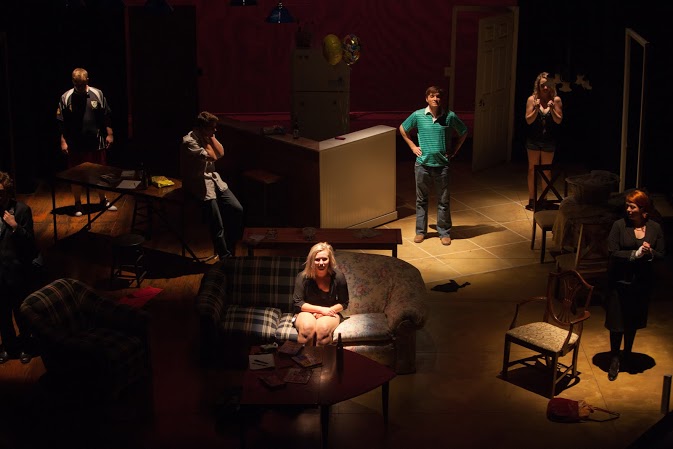
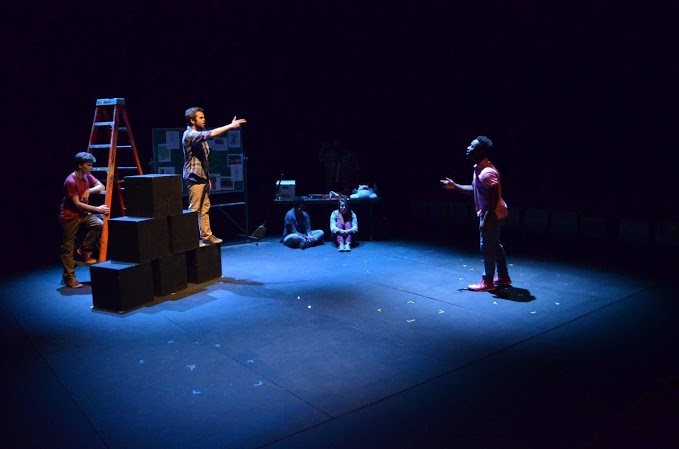
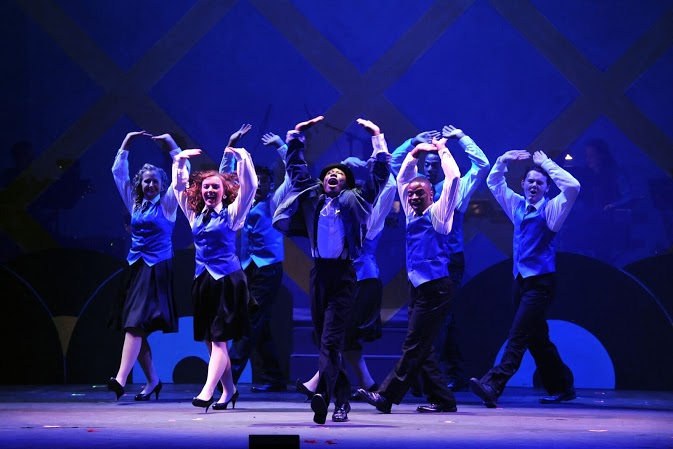
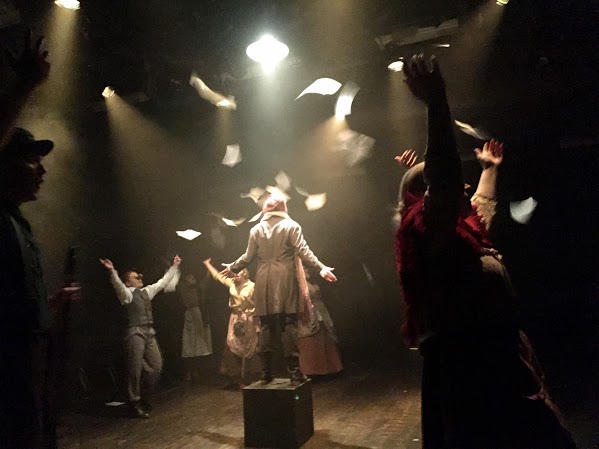
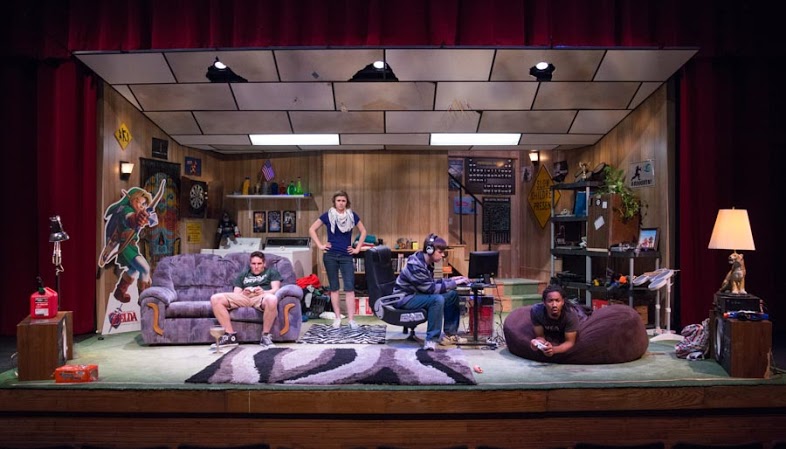
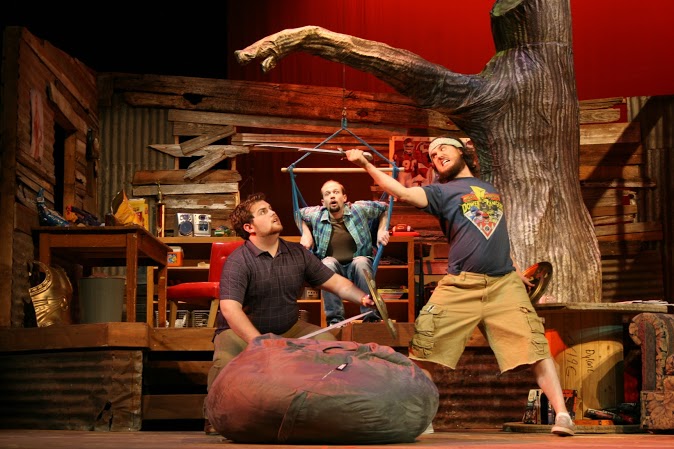
 RSS Feed
RSS Feed